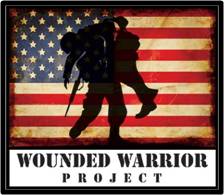Monday Author: Susanne Skinner
Veterans have a special place in my heart. There is no greater sacrifice than writing a blank check to your country that could require payment with your life. Every veteran deserves our thanks and support. Every wounded veteran deserves charitable organizations that serve their needs in a real and verifiable way.
 There are many fine organizations that work to that end—too many to name here—but some are less than credible. One I have believed in and supported has raised red flags in the media recently, and not in a good way.
There are many fine organizations that work to that end—too many to name here—but some are less than credible. One I have believed in and supported has raised red flags in the media recently, and not in a good way.
Among the largest veteran’s charities in America, the Wounded Warrior Project has come under pretty intense scrutiny in the past 24 months. Recent reports cause me to question its leadership, financial management and purpose. Is it a legitimate charity? Does it uphold its mission statement? Does it serve our veterans?
Despite my research I am reluctant to say it does not with unbiased certainty. I hesitate to condemn them without hearing from veterans. Maybe some of you who have lived it can help me find the truth.
The Wounded Warrior Project was founded in 2002 and states their mission
“is to honor and empower wounded warriors. Our purpose is to raise awareness and enlist the public’s aid for the needs of severely injured service men and women; to help severely injured service members aid and assist each other; and to provide unique, direct programs and services to meet the needs of severely injured service members.”
Veterans deserve the best. Is this it?
Picking the Right Charity
Recently my book club read With Charity for All, written by NPR CEO Ken Stern. He pulled back a very large curtain on the 1.4 million charities in this country, revealing a workforce of 13 million, 61 million volunteers and annual revenues in excess of $1.5 trillion. I learned that charitable giving accounts for 10 percent of US economic life and not all charities are created equal. There are many flaws in the system, from phony tax-exempt charities to charitable organizations that pay their executives millions; and of course organizations that raise millions but never support the mission they claim to serve.
 In January, CBS News raised the biggest red flag of all when they conducted a three-part investigation into WWP. They spoke to more than 40 former employees who described a charity where spending was out of control. One former employee referred to WWP’s management as “what the military calls fraud, waste and abuse.”
In January, CBS News raised the biggest red flag of all when they conducted a three-part investigation into WWP. They spoke to more than 40 former employees who described a charity where spending was out of control. One former employee referred to WWP’s management as “what the military calls fraud, waste and abuse.”
Those interviewed said the Wounded Warrior Project spends less than 60 percent of its money helping veterans. Former workers claim excessive amounts of money spent on conferences and parties are referred to as fundraising activities. According to the charity’s tax forms, spending on conferences and meetings went from $1.7 million in 2010 to $26 million in 2014. Red flag.
Steven Nardizzi (a non-veteran) became CEO in 2009 with an annual salary of $500K. After this report aired, many called for his resignation. He refused CBS’s request for an interview. CBS concluded “It’s more about the Wounded Warrior Project and less about the wounded warrior.”
Members from a closed Linked In group (you must be active duty or a veteran) posted hundreds of warnings stating WWP doesn’t perform any services for wounded veterans. They take in hundreds of millions in donations, keep tens of millions, and donate a portion to small local charities that actually have the programs and services for veterans. Even the IRS has raised questions about where the money goes.
Where Does Your Money Go?
Finding the answer to this question is not as easy as it looks.
Start with Charity Navigator, a site that provides unbiased, fact-based information on every charity in America. They give Wounded Warrior Project 3 out of 4 stars, a financial rating of 78 out of 100 and a transparency rating of 96 out of 100. But the data is two and a half years old and WWP has not provided new numbers. Big red flag.
 At the end of fiscal 2012 the organization reported $154.9 million in revenue. According to Charity Navigator, WWP spent $95.5 million in those 12 months, including $55.3 million on programs serving wounded veterans and their families.The red flag: WWP spent 57% of the money they SPENT in 2012 on services for veterans, but spent roughly one-third of the money they RECEIVED in 2012 on services for veterans. Same statistics; two ways of reporting the numbers.
At the end of fiscal 2012 the organization reported $154.9 million in revenue. According to Charity Navigator, WWP spent $95.5 million in those 12 months, including $55.3 million on programs serving wounded veterans and their families.The red flag: WWP spent 57% of the money they SPENT in 2012 on services for veterans, but spent roughly one-third of the money they RECEIVED in 2012 on services for veterans. Same statistics; two ways of reporting the numbers.
Either way, the money is not making its way to veterans. According to their own FY 2012 financials, the Wounded Warrior Project was sitting on $175.5 million—more than the total amount the charity spent on veterans in all of FY 2013.
To put this in perspective:
- Harvard University has its own hedge fund containing over $30 billion dollars.
- General Motors has its own bank with $38 billion in it.
- General Electric has a bank so big nobody knows what’s in it.
The difference is that none of these institutions are charities; they are investment banks that can hedge, invest, sell, sit on or gamble the money any way they choose. Is the Wounded Warrior Project a charity or an investment bank?
 Here’s another perspective. Veteran’s charity Fisher House has 95% of their donations going directly to veterans. Fisher House receives top marks from charity navigator and is 25 times more efficient than the Wounded Warrior Project when it comes to fundraising.
Here’s another perspective. Veteran’s charity Fisher House has 95% of their donations going directly to veterans. Fisher House receives top marks from charity navigator and is 25 times more efficient than the Wounded Warrior Project when it comes to fundraising.
This question here is about the purpose and mission of an organization that flies the tax-exempt charity flag while currently sitting on $248 million. It’s about an organization appearing to be focused more on raising money than using it to serve and care for wounded veterans.
There are so many veterans in need of support, and many veterans’ organizations worthy of our support. Is Wounded Warrior Project one of them?

I am calling for an open audit by petition: https://www.change.org/p/steve-nardizzi-we-demand-accountability-of-wounded-warrior-project?recruiter=492135622&utm_source=share_petition&utm_medium=copylink
Thank you for this timely blog.
Great article! Thanks so much! I will be passing this info on! We long ago gave up donating to the United Way and similar funds because of all the corruption involved. We now give mainly to individuals who need help (we know them personally) and to the Salvation Army. Goodwill is a scam too.